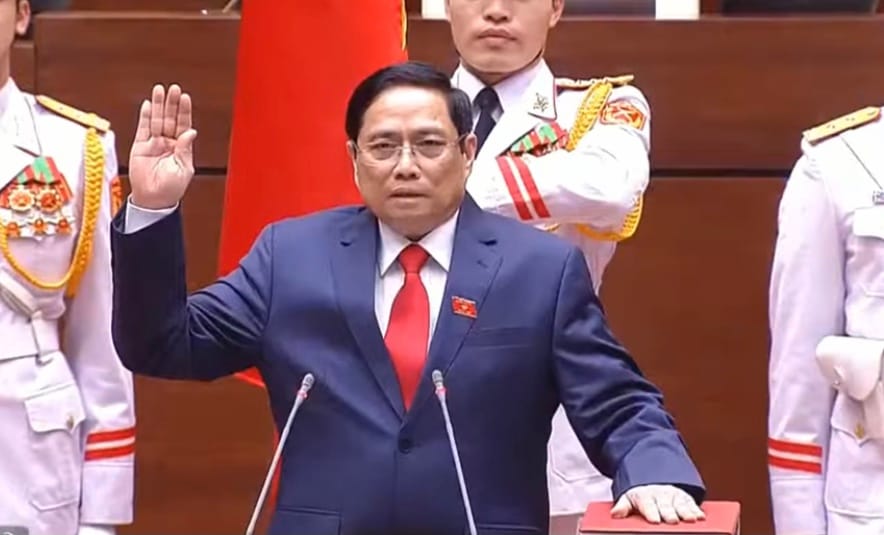
Vietnam PM warns regional leaders over local gov’t overhaul
During the country’s ongoing administrative overhaul, provincial leaders will be held accountable for failures, Vietnamese Prime Minister Pham Minh Chinh said on 21 July.
New system took effect on 1 July
His remarks came as Vietnam transitions to a new two-tier system that abolishes district-level governance and merges 63 provinces and cities into 34. The Vietnamese National Assembly approved the legal foundation for the reform on 12 June, and it took effect nationwide on 1 July.
Each province was required to finalise new leadership appointments, commune boundary changes and inter-provincial integration protocols by 30 June. Vietnam's new mega-provinces are now responsible for inter-regional planning, taxation, infrastructure and social services. Provincial party leaderships have also been reshuffled.
Chinh said the restructuring should not disrupt public services nor harm citizens’ interests, speaking at inspections in the southern Vietnamese provinces of An Giang and Dong Thap, west of Ho Chi Minh City.
The Vietnamese Home Affairs Ministry said the reforms aim to streamline local governance, cut bureaucratic overlap and speed up administrative decisions. Prime Minister Chinh reiterated this message on 3 July, during the first online conference between central and provincial authorities under the new system.
The restructuring is seen as part of Communist Party general secretary To Lam’s consolidation strategy ahead of the 2026 party congress. Party appointments for the new system have favoured technocrats aligned with Hanoi’s national planning priorities.
Mixed investor sentiment
The reforms will improve the country’s business climate by streamlining approval processes and accelerating infrastructure development, the Vietnamese Planning and Investment Ministry said.
Earlier this month, a Reuters survey of Southeast Asian investment firms reported cautious optimism, noting potential long-term benefits but warning of short-term disruptions, legal ambiguity and inconsistent provincial communication.
EuroCham, which groups European businesses in Vietnam, identified multi-tier approvals as a major bottleneck for foreign investors in a December 2024 paper.
Restructure cuts more than 100,000 roles
Around 79,000 local posts have been removed through retirements, contract expirations and layoffs, the Vietnamese Labour Ministry said. These cuts followed the February merger of 8 ministries, which cut 23,000 positions.
The total impact could affect as many as 250,000 public workers, including part-time and auxiliary roles, consulting and research organisations estimate.
The reforms will likely improve efficiency but also reinforce central control, policy analysts at the Singaporean research institute Yusof Ishak Institute (ISEAS) said.
By eliminating district-level structures and halving the number of provincial administrations, the Vietnamese Communist Party has tightened its oversight of personnel, budgets and programme delivery, according to ISEAS.
While Vietnamese state media have reported positive momentum, private sector groups and social media users have highlighted staffing gaps, confusion over responsibilities and delays in project approvals.
On 10 July, Radio Free Asia reported that several provinces had requested enforcement delays, citing shortages of trained personnel and pending legal amendments. Public service continuity in healthcare and education remains a key concern.
Merged provinces and administrative clusters
Vietnamese MPs approved the legal foundation for the reforms on 12 June. Each province was then required to finalise new leadership appointments, commune boundary changes and inter-provincial integration protocols by 30 June.
The administrative reform has now moved from policy to enforcement. As 34 provinces replace 63, and the district level is eliminated, the new system centralises control while aiming to improve efficiency and responsiveness. The challenge in the months ahead will be delivering results without overloading local systems or eroding public trust.
Confirmed mergers include Khanh Hoa with Ninh Thuan, Ha Giang with Tuyen Quang and the absorption of Ba Ria-Vung Tau into Ho Chi Minh City, south Vietnam. In central Vietnam, Quang Binh and Quang Tri were consolidated, with new commune-level clusters formed under names such as Nam Ba Don, Kim Phu and Tuyen Phu.
Sources
- VietnamPlus – PM chairs first post-reform meeting
- VietnamNet – PM issues warning in An Giang and Dong Thap
- Reuters – Vietnam streamlines state structure
- People Matters – 79,000 jobs cut
- Vietnam Briefing – Legal transition analysis
- ISEAS Perspective – Political and structural implications
- Radio Free Asia – Implementation delay requests
